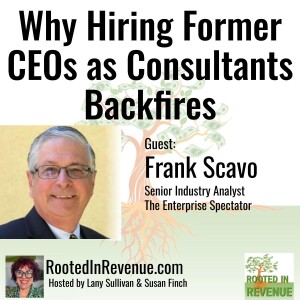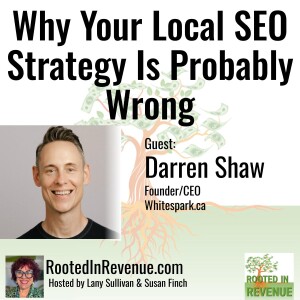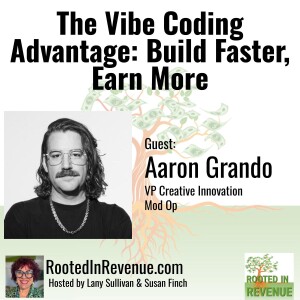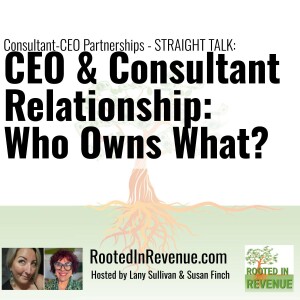Rooted In Revenue
Business Strategy
Episodes

Wednesday Jan 28, 2026
How Your Nap Spot on the Couch Affects Your Business Success
Wednesday Jan 28, 2026
Wednesday Jan 28, 2026
After getting flooded with AI-generated guest pitch emails, Susan and Lany decided to remind everyone what Rooted in Revenue is really about. It's not just about making money. Everything you do impacts your revenue: your sleep patterns, your workspace, your team, even that specific spot on your couch where you always fall asleep. The podcast is about how to keep money from draining out of your business through inefficiency, procrastination, and all those hidden time thieves you don't even notice.
Neither Susan nor Lany went to college. They learned to run businesses by working in businesses, making mistakes, and course-correcting. The education system doesn't teach you who to hire first, when to buy the domain, or that you probably don't need a 40-page business plan. Real business transformation takes 9-12 months, not 30 days, because you need space to think, innovate, and rediscover the joy you'd forgotten about. Time is your real currency, and everything is rooted in revenue.
TIMESTAMPS
00:45 - Why they started Rooted in Revenue several years ago
01:45 - Everything impacts your revenue: systems, processes, efficiency
02:30 - You're an athlete in your business: how is the athlete performing?
03:30 - The education system doesn't teach you how to run a business
07:15 - Small Business Development Centers (SBDC) and their limitations
08:15 - The problem with business plan obsession
11:45 - The biggest deficit: time, not money
13:15 - The trap of creating vs. implementing with AI tools
13:45 - The Love-Hate-Delegate framework
17:30 - Using spreadsheets with formulas to track tasks
23:30 - Nine to twelve month process vs. 30-day overwhelm
24:30 - The plan is never the plan: it's a concept
25:45 - Rediscovering joy and forgotten talents
26:30 - Cheryl Walsh's Laguna's underwater mermaid photography metaphor
27:30 - What you say vs. what the team says vs. what consultants find
28:00 - Bringing back the original spark
28:15 - Lany's six-week Chaos Cleanse Facebook group
29:00 - Reviewing old course materials for new insights
29:30 - Keeping materials in a "Stuff I Learned" folder to revisit and search

Wednesday Jan 21, 2026
Tool Addiction is Killing Your Company Culture
Wednesday Jan 21, 2026
Wednesday Jan 21, 2026
Technology promises to solve every business problem, but what if the tools themselves are creating the chaos? Susan Finch and Lany Sullivan explain some reasons why organizations continue to struggle despite investing in the latest software, platforms, and systems.
The pattern is predictable: Someone attends a conference, hears about a game-changing tool, signs up immediately, and brings it back to the team without considering compatibility, redundancy, or whether anyone will actually use it. Or worse, a new executive arrives and forces their favorite tools on everyone without understanding existing workflows.
Before reaching for another software solution, companies need to answer fundamental questions about mission alignment, internal communication, and who will own the implementation. The disconnect between leadership vision and team reality creates friction that no amount of technology can fix.
They break down the patterns they see repeatedly: reactive purchasing, shiny object syndrome, and tools piled on top of unresolved problems. They offer a framework for slowing down, asking better questions, and ensuring your team is aligned before spending another dollar on software that might just become expensive shelfware.

Tuesday Jan 13, 2026
The Real Cost of Handing Out Company Credit Cards Without Controls
Tuesday Jan 13, 2026
Tuesday Jan 13, 2026
Susan Finch and Lany Sullivan dig into something nobody wants to talk about but everybody needs to hear. A client's new bookkeeper asked a simple question about canceling a former employee's card. The owner said they already had the card. Turns out the physical card was in a desk drawer, but the numbers were saved in the employee's personal Amazon account. For 18 months.
Lany brings her banking background to this conversation - branch operations, mortgage processing, risk management, the whole deal. She's seen what happens when businesses don't have proper controls in place. She's also seen the theft, the fraud, and the embezzlement that follows.
They walk through why your bookkeeper just paying the bill isn't oversight. Why the "put it on your personal card and expense it" model doesn't work anymore. Why most employees probably don't need company cards at all. And what to do instead - purchasing processes, approval limits, the works.
If you've got company cards floating around and you're not 100% sure where they're saved or what they're being used for, this episode is for you.
00:00 - Introduction and WinCo shopping conversation00:45 - The company credit card discovery story02:00 - How easy it is to add cards to personal accounts03:15 - Why checks and balances are critical04:15 - Understanding financial leakages and OPM05:15 - Risk tolerance and compliance boundaries06:00 - The bookkeeper's role in reconciliation06:30 - Small business vulnerabilities07:00 - The American Express expense report model08:00 - Individual card numbers and identification09:00 - Generational differences in floating expenses09:30 - Two-factor authentication and dual signers10:00 - The four-step purchasing process11:00 - Setting spending limits and approval levels12:30 - Trusted contractors and liability14:00 - Ethical contractor practices15:00 - Who really needs a company card16:00 - Onboarding and credit card policy documentation17:00 - Honest mistakes vs. intentional fraud18:30 - Simple prevention: stickers on business cards19:00 - The debt obligation reality20:00 - Rethinking your approach21:00 - Executive branch only recommendation22:00 - Streamlined purchasing processes23:00 - Questions for your bookkeeper24:00 - Real theft, fraud, and embezzlement experiences

Thursday Jan 08, 2026
The Content Churn Killed Quality and We Let It Happen
Thursday Jan 08, 2026
Thursday Jan 08, 2026
We're drowning in content glut. Empty posts churned out to keep up with everyone else. There's no joy, no depth, no controversy. You can FEEL the difference between obligated content versus real engagement.
What are we losing? The skill of conversation. The skill of listening. Those spontaneous "hey, come look at this" moments. Pulling each other into offices to analyze something together. These aren't scheduled Q&A sessions. These are the messy, real exchanges where magic happens.
Here's what's fascinating: I was editing Deborah Fell's episode when she mentioned a CEO who told her he NEVER takes meetings, that his schedule is impossible, and that she shouldn't even try. But when she said, "Would you like to be on my podcast?" His response? "Oh, I'm glad to do that."
Professionals at all levels don't want more meetings, sales pitches, or brain-picking sessions. They want real conversations with pushback. They want to share their stories. The best ones are willing to go eyeball to eyeball on important topics.
Stop trying to feed the algorithm with volume. Stop the sycophant responses and empty praise. Stop formatting everything with bullets just because you think you're supposed to.
Start having conversations worth recording. Start capturing spontaneity. Start admitting when we don't have the answer and need to think together. Start going back to people and saying, "Remember when we talked about this? What happened?" Consider getting the "monument" update - the current state of a conversation or event of the past.
That's what this conversation with Deborah is about. Getting back to real conversations.

Wednesday Nov 05, 2025
SOPs - Your Business's Secret Weapon Against Chaos
Wednesday Nov 05, 2025
Wednesday Nov 05, 2025
Stop drowning in business chaos - your SOPs are the life raft you need. In this game-changing episode, Susan Finch and Lany Sullivan expose why your team's knowledge hoarding is sabotaging growth and share their proven system for creating procedures that actually get used. They reveal why writing at a 5th-grade level isn't dumbing down - it's smartening up your business operations.
From horror stories of employees creating secret binders to success stories of businesses transformed through proper documentation, this episode delivers the blueprint for organizing years of scattered procedures into one powerful system. Learn the exact folder structure, naming conventions, and review processes that turn procedural chaos into operational clarity. Whether you're a solopreneur ready to scale or managing a team that's reinventing the wheel daily, this episode provides the roadmap to document, delegate, and finally find joy in your work again.
As always, we try to give you an action list you can do on your own:
Immediate Actions (This Week):
Create Your Hub • Set up a main folder called "SOPs," "Procedures," or your preferred name • Ensure it's in a shared drive accessible to your team • Remove individual access permissions temporarily if needed
Assess Current State • List all the procedures you currently have documented • Identify which team members have created their own "personal" procedures • Note any critical processes that exist only in someone's head
Choose Your Categories • Divide your business into main operational areas (e.g., Admin, Sales, Production) • Create main folders for each category • Keep it simple - aim for 4-7 main categories maximum
Short-Term Actions (Next 2-4 Weeks):
The Great Document Dump • Move ALL documents from subfolders into main category folders • Review for duplicates and conflicting versions • Don't panic - this temporary chaos leads to clarity
Establish Naming Conventions • Agree on a team-wide naming system • Include dates, version numbers, or status (TBD, Complete, Archive) • Rename all documents consistently
Create Missing SOPs List • For each category, list procedures that need documentation • Create placeholder documents titled "[Process Name] - TO BE COMPLETED" • Assign ownership and deadlines
Medium-Term Actions (Next 1-3 Months):
Develop Your SOP Template • Include: Purpose, Tools Needed, Step-by-Step Instructions, Screenshots • Add revision dates at the top • Create a video component for complex procedures
Write Priority SOPs • Start with your "hit by a bus" procedures - the critical ones only you know • Use simple language (5th grade level) • Include where to find things, which buttons to click, what fields to complete
Implement Approval Process • Create a procedure for creating procedures • Establish who approves new SOPs • Set review cycles for existing procedures
Long-Term Actions (Ongoing):
Build the Habit • Schedule weekly SOP time • Update procedures as processes change • Archive outdated versions rather than deleting
Create Onboarding Materials • Develop a "Start Here" folder for new team members • Include how to navigate the SOP system • Add role-specific procedure lists
Regular Maintenance • Quarterly reviews of high-use procedures • Annual audit of all SOPs • Celebrate when team members create or update procedures

Wednesday Aug 27, 2025
When Automation Experts Struggle with Their Own Systems
Wednesday Aug 27, 2025
Wednesday Aug 27, 2025
Today's episode could save you 20% or more on overhead costs while boosting employee retention by up to 45%.
My guest is Alane Boyd, Co-CEO of BiggestGoal.ai and workflow automation expert with nearly two decades in tech. But here's what sets her apart: instead of forcing you into complicated project management tools you'll hate, she works with what you already use and love.
Alane's built her philosophy around "retention not replacement" - using automation to free your team for strategic work, not eliminate their jobs. She's a serial entrepreneur, three-time published author, and her tools were voted Best for Remote Work in 2022.
In this conversation, we dive into real client examples, including a 70% time reduction in podcast production workflows, why most automation fails, and the one simple automation you can implement this week. Plus, Alane gets refreshingly honest about why being the "hero consultant" doesn't work.
Links from this episode:
Alane Boyd on LinkedIn
BiggestGoal.ai
Alane Boyd on LeaderGeneration
Susan Finch on LinkedIn
Rooted in Revenue with Patty Parobek from Mod Op
Binky Patrol
SusanFinch.com

Wednesday Aug 06, 2025
Why Your SEO Foundation Determines AI Visibility
Wednesday Aug 06, 2025
Wednesday Aug 06, 2025
Google First, AI Second: The Smart Agent Strategy
Your prospects aren't abandoning Google - they're using it PLUS asking ChatGPT, Perplexity, and Claude for deeper research.
Here's the reality: Google still processes 373 times more searches than ChatGPT. But the 1% of prospects using AI answer engines? They're your highest-intent leads spending 23+ minutes researching before they ever call an agent.
Most real estate professionals are asking the wrong question. Instead of "Should I optimize for AI or Google?" the question is "How do I dominate both?"
Maurice White, SEO lead at Mod Op and former real estate professional, reveals why your SEO foundation determines your AI visibility. You'll discover why 80% of getting found by ChatGPT, Claude, and Perplexity depends on fundamental SEO - and what that crucial 20% difference is that separates agents who get cited from those who remain invisible.
This isn't about replacing your Google strategy. It's about extending your reach to capture the early adopters who are doing deeper research and making more informed decisions before they contact agents.
If you serve local clients - real estate, HVAC, restaurants, professional services - this matters now, not later.
About Maurice White:
Maurice White is a Senior SEO Strategist at Mod Op with a unique background that bridges real estate and digital marketing. After spending over 10 years in the real estate industry as a broker's assistant, agent, and licensed broker, Maurice transitioned to leading SEO strategy for one of the industry's top agencies.
His hands-on real estate experience, combined with his technical expertise in data analysis and SEO strategy, gives him rare insight into how local businesses can leverage both traditional search optimization and emerging AI engine visibility. Maurice specializes in helping companies organize complex digital strategies, make data-driven decisions, and implement scalable SEO solutions.
BONUS ACTION LIST:
Here's the action list for this episode based on Maurice's insights:
Immediate Actions (This Week)
Test Your Current AI Visibility:
Go to ChatGPT, Claude, or Perplexity and ask questions about your market that you should be the expert on
Search: "Who are the most knowledgeable agents in [your area]?"
Ask: "What's the market like in [your specific neighborhoods]?"
Note if your name or business appears in the answers
Audit Your Current Content:
Review your last 20 social media posts
Count how many mention your specific market by name
Identify which posts could be used by any agent in any city
Calculate what you're actually paying per valuable, market-specific post
Foundation Check:
Verify your Google Business Profile is complete and optimized
Ensure your service areas are properly defined
Check that your website has basic contact information and location details
Review if your site loads quickly on mobile
This Month Actions
SEO Foundation Audit:
Conduct a technical SEO audit of your website (or hire someone to do it)
Review your site's information architecture and navigation to ensure a logical progression to the next step, which should lead to a conversation.
Verify that schema markup is in place with all of your content. ASK the hosting company or developer. They may not know.
Assess your heading structure (H1, H2, H3 tags)
Content Strategy Development:
Create 5 pieces of content that answer specific questions about your market areas
Create a summary for key landing pages from your top-level navigation, ideally accompanied by a short video featuring you.
Add FAQ sections to key pages on your website - these become part of your content bank.
Write market-specific summaries for each neighborhood you serve - and revisit/edit a couple of times a year.
Include current data, statistics, and local insights in your content as stand-out boxes with H1, H2, H3 tags.
Then, create regular market update blog posts.
Local Authority Building:
Set up a plan to post weekly to your Google Business Profile - something HELPFUL without having to click to get the info - but they can click and go to your site to the page with the details.
Join relevant local Reddit communities (professionally and helpfully)
Reach out to local publications for market commentary opportunities
Ask satisfied clients to leave detailed, specific reviews
How about you pick 2 industry businesses per month to review positively? Login on Google as your brand and do it.
Ongoing Strategy
Content Creation System:
Develop templates that require local market data
Create a process for adding your unique insights to any AI-generated content
Plan quarterly updates to keep information fresh
Build relationships with other local business owners for cross-promotion
Measurement and Tracking:
Set up Google Search Console to monitor AI Overview performance
Use tools like SEMRush to track your visibility in the answer engines
Monitor which market-specific content gets the most engagement
Track leads that mention finding you through AI research
Provider Evaluation: If you're currently paying for automated content, ask these questions:
Do the automated posts I'm paying for reference my actual market area by name?
Can I customize the post content with my local insights?
Are these exact posts, or pretty similar posts and images, being used for other agents?
How much control do I have over the messaging and tone?
What's my cost per truly valuable post, if there are any?

Wednesday Jun 25, 2025
Why Hiring Former CEOs as Consultants Backfires
Wednesday Jun 25, 2025
Wednesday Jun 25, 2025
When Frank Scavo sent me his latest article about consulting skills, I knew we had to dig deeper. After 20 years of working together—first as his client, then as colleagues—we've lived the collaborative consulting model he champions. In this conversation, we explore why seasoned executives often struggle to transition into consulting, the critical difference between having authority and wielding influence, and why the best consulting relationships blur traditional boundaries. Frank shares hard-won insights from his 50-year career, including the fascinating failure of his "retread model" and what it really takes to move from telling people what to do to helping them discover solutions together.
Links from this episode:
Frank Scavo on LinkedIn
The Enterprise Spectator on Substack
Arabella Penrose Books
"Flawless Consulting" by Peter Block
Previous episode we refer to.
Growth Resources Institute
Binky Patrol

Wednesday Jun 04, 2025
Why Your Local SEO Strategy Is Probably Wrong
Wednesday Jun 04, 2025
Wednesday Jun 04, 2025
Local SEO just got a reality check. Darren Shaw, founder of Whitespark, joins Rooted in Revenue to debunk some widely held myths while sharing what actually drives results for small businesses trying to dominate local search. If you're a real estate agent sharing office space with ten competitors, a service provider working from home, or any brick-and-mortar business wondering why your Google rankings aren't improving despite "doing everything right," this conversation will change how you approach local SEO forever.
Shaw breaks down the local filter that's silently crushing businesses sharing addresses, reveals why citation consistency isn't the ranking factor everyone thinks it is, and explains why your Google Business Profile needs constant attention, not a "set it and forget it" approach. Plus, he tackles the age-old question about Yelp's practices and shares the one ranking factor that trumps almost everything else.
About Darren Shaw
Darren founded Whitespark in 2005 as a web design and development company; however, his passion and curiosity for all things local search led to a shift in focus in 2010, and ultimately to what the company is today. These days, Whitespark specializes in local search software and services and is one of the most respected and cited in the industry.
Darren has been working on the web for over 19 years and loves everything about local SEO. He leads research initiatives such as the Local Search Ranking Factors survey and the Local Search Ecosystem. He is a regular contributor to search marketing publications, and speaks at conferences around the globe.
When Darren isn’t speaking at conferences, researching the latest in local search or designing the next best local SEO tool, he is spending time with his wife and daughter in their hometown of Edmonton, Alberta. In his spare time he’s traveling, sporting fancy socks, and drinking too much coffee.
Social Links:
https://whitespark.ca/
https://www.linkedin.com/in/darrenshawwhitespark/
https://www.instagram.com/darrenshawseo/
https://www.facebook.com/darrenshawseo

Wednesday May 28, 2025
The Vibe Coding Advantages: Build Faster, Earn More
Wednesday May 28, 2025
Wednesday May 28, 2025
I heard Aaron Grando drop the term "pretotypes" on Leader Generation this morning and had to hit pause. Three minutes in, I realized I'd been vibe coding for months without knowing there was a name for it.
But pretotypes? That's when I knew I had to get him on the show immediately.
We're talking about taking your stream-of-consciousness ideas and building working drafts before you've even figured out what you want. For business owners doing $0.5 to 10 million a year, this isn't just another tech trend—it's the shift that stops you from waiting weeks for simple prototypes.
Aaron's VP of Creative Innovation at Mod Op, and in this spontaneous follow-up to his Leader Generation episode, we dig into what vibe coding actually means for your bottom line and why small teams are suddenly punching way above their weight class.
Action items to consider that tie to this episode:
Immediate (This Week)
Identify your development bottlenecks - Where are you currently waiting on programmers or outsourced developers?
Try a simple test - Pick one small coding need and experiment with ChatGPT or Claude
Map your current process - Document how long it takes to go from idea to working prototype
Set prompt boundaries - Practice asking AI for logical, non-emotional responses
Short-term (Next 30 Days)
Assess team capabilities - Identify who on your team has enough coding background to effectively prompt AI tools
Start with pretotypes - Use AI to visualize one business idea before investing in full development
Test platform limitations - Use AI to check if your ideas are feasible within your current tech stack
Calculate current costs - Figure out what you're spending on development delays and outsourcing
Medium-term (Next 90 Days)
Build AI into your process - Make vibe coding part of your standard ideation workflow
Train your team - Get key team members comfortable with AI coding tools
Measure time savings - Track how much faster you can go from idea to testable concept
Expand use cases - Beyond coding, use AI for project planning, gap analysis, and cross-industry perspectives
Strategic (Next 6-12 Months)
Evaluate in-house vs. outsourcing - Determine if AI tools change your staffing strategy
Invest in the right tools - Move beyond free ChatGPT to specialized coding tools if volume justifies it
Create AI-enabled processes - Build systems that let AI agents handle routine business tasks
Develop competitive advantage - Use speed-to-market improvements to outmaneuver slower competitors
Key Questions to Ask Yourself
Before listening:
How long does it currently take us to go from business idea to working prototype?
What development tasks are we avoiding because they seem too time-intensive?
After listening:
What's the first idea I've been putting off that I could pretotype this week?
Who on my team could become our "conductor" for AI-assisted development?
What would it mean for our business if we could cut development time by 75%?
Resources Mentioned
Tools: ChatGPT, Claude, Cursor (coding-specific AI)
Concept: Pretotypes (pre-prototype visualization)
Original episode: Leader Generation Podcast - "Vibe Coding" episode with Aaron Grando Here is the episode on Leader Generation.
About Guest Aaron Grando:
Aaron Grando, VP, Creative Innovation on Mod Op's Innovation team, is a seasoned technologist with over 15 years of experience at creative agencies. With a background in strategy, design, engineering, and marketing, Aaron has worked extensively in industries like media, entertainment, gaming, food & beverage, fashion, and technology. At Mod Op, Aaron leads efforts to integrate AI into creative processes, creating tools that connect creatives and clients with insights, spark ideas, and enable new brand experiences. Projects include collaborations with companies like NBCUniversal, Bethesda Softworks, Under Armour, Planet Fitness, Dietz & Watson, and more, focusing on infusing creative strategies with innovative technology to create cutting-edge brand experiences.

Wednesday May 14, 2025
CEO & Consultant Relationships: Who Owns What?
Wednesday May 14, 2025
Wednesday May 14, 2025
Lany and Susan dive into the sometimes murky waters of consultant-client relationships. Drawing from years of experience sitting on every side of the boardroom table, they tackle the age-old question: "Who is responsible for doing the tasks at hand?"
Let's face it—consultants don't come with magic wands, and CEOs don't get to toss the keys and walk away. Whether you've ever wondered "Why isn't this working?" or "I paid a consultant, so why isn't everything fixed?" this episode cuts through the confusion with practical advice on setting boundaries, managing expectations, and creating successful partnerships.
Susan and Lany share real-world stories about scope creep, communication breakdowns, and the emotional rollercoaster that can derail even the best-intentioned business relationships. They also offer straightforward tips for both sides to keep things running smoothly, from clear contracts to honest conversations about decision-making authority.
Tune in for a no-nonsense discussion about what makes consultant-CEO partnerships work, and what doesn't!
Key Points from the Episode
Clear Roles and Responsibilities: CEOs and consultants must understand who owns what in the relationship. Consultants provide expertise and guidance, but CEOs remain the ultimate decision-makers.
Communication is Critical: Most problems in consultant-client relationships stem from poor communication or unclear expectations.
Consultants' Role: Consultants bring fresh perspectives, specialized expertise, and assessment capabilities but aren't responsible for the final decisions or outcomes.
CEO Authority: Business owners need to maintain their decision-making power and not abdicate responsibility to consultants.
Documentation and Contracts: Clear contracts and documentation help prevent scope creep and establish expectations for both parties.
Implementation Shared Effort: Even after a consultant provides recommendations, implementation requires effort from both parties.
Knowing When to Part Ways: Sometimes the relationship isn't a good fit, and both parties should know how to amicably end the engagement.

Wednesday May 07, 2025
Your Email Is Your First Impression – Why Branded Email Matters
Wednesday May 07, 2025
Wednesday May 07, 2025
In this episode, Susan Finch and Lany Sullivan revisit a topic we can’t stress enough: branded email addresses. Using Gmail, Yahoo, or even AOL for business? You’re losing trust before the conversation starts. We dig into real examples, onboarding requirements, offboarding protocols, and the risk of letting your team operate with inconsistent or unprotected emails. Your email isn’t just a communication tool—it’s your brand's handshake.
Related Reading:
Domain, Email & Website Evaluation for Your Brand
Why Branded Email Matters – Quick Reminder
Listen, nod, then take action.